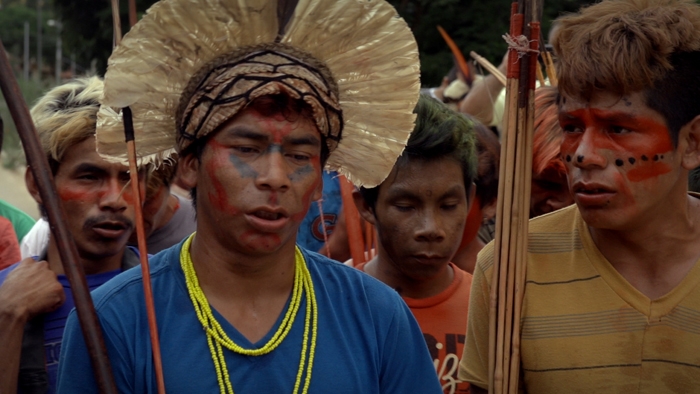Imagined Communities, the 21st edition of Videobrasil, takes its title from a 1983 book by Irish political scientist Benedict Anderson that describes nationality, ‘nation-ness’ and nationalism as ‘cultural artefacts of a particular kind’. For the curators of this film-festival-turned-art-biennial, with its admirable and longstanding focus on artists from the ‘global south’, they are artefacts long-past their sell-by date. Instead, at SESC’s new downtown arts centre, and in the accompanying cinema programme, the viewer is presented with examples or propositions for postnational communities (‘in the minds of each’ such group, to borrow Anderson’s words concerning national identity, ‘lives the image of their communion’), as well as, in the case of the seven indigenous artists and collectives, those identities forged prior to the colonial imposition of a nation state.
A video by Brazilian artists Paulo Mendel and Vitor Grunvald stands out. Domingo (Sunday, 2018) documents a group of young gay and trans friends living in a poor neighbourhood on the outskirts of São Paulo. Cans of cheap beer in hand, at times deploying Pajubá, the Brazilian Portuguese gay cryptolect, they joke and mess around on the streets. As an impromptu party gathers, these charismatic characters decide to end their weekend by attending a protest against then-president Michel Temer in the centre of the city (“I want to show up on TV, fag,” one boy says to another). For most of its 25-minute duration, the work hinges on the dialogue between subjects, but as it draws to a close, we lose track of the kids amidst volleys of teargas deployed by the police as the protest turns into a riot. On the wall behind Mendel and Grunvald’s video, playing across two monitors in the centre of the gallery, is Syrian-born Hrair Sarkissian’s Execution Squares (2008). To the right hangs Ojibwe painter Jim Denomie’s O the Reservation (or Minnesota Nice) (2012). The former consists of a series of large-format photographs of empty crossroads and public spaces in Aleppo, Latakia and Damascus, all of which have been the sites of public hangings. Denomie’s work is a vast painting depicting the 1862 battle between United States armed forces and the Dakota people, who had revolted against starvation and enforced poverty. In response, 38 Dakota were hung in Mankato, Minnesota (the largest mass execution in the history of the US). All of these works demonstrate the extent to which the state will act in order to protect its sovereignty. Likewise demonstrating the fealty demanded by the nation-state is Roney Freitas and Isael Maxakali’s Grin (2016). Shown as part of the daily film programme (screened in a makeshift auditorium; while previous editions of Videobrasil were held at one of SESC’s much more spacious arts venues across town, as well as in a local cinema, this edition felt cramped at times, and the audiovisual quality suffered), the 40-minute film tells the story of the Guarda Rural Indigena, a military platoon made up of men from the Maxakali tribe forcibly conscripted during the early 1970s (and made to police and subjugate their own people) by the Brazilian military dictatorship.
Though the curators happily allow the exhibition a freedom to go off on tangents concerning nature (Paul Rosero Contreras’s excellent Dark Paradise: Humans in Galapagos, 2016–19, which mixes magical realism with pointed questions concerning the ecology of the titular islands) and urbanism (Georges Senga’s photographs of Congolese houses at the centre of inheritance disputes, alongside his pictures of houses in Brazil marked for sale), among other subjects, it is identity politics that underpins much of the show. This is unsurprising given that the exhibition takes place in a country experiencing the white heat of a culture war, in which, when the new culture secretary, Roberto Alvim, says things such as, ‘Like the Crusaders, we are fighting barbarian invasions against the principles and values of our Judeo-Christian civilization’, it is impossible not to take sides, however destructive the polarisation of society may be. Intractable division lies at the heart of Omar Mismar’s Schmitt, You and Me (2016–17), which consists of the owner and the manager of a gun shop in Skowhegan, Maine, reading aloud ‘The Concept of the Political’, a 1932 essay by rightwing philosopher Carl Schmitt. Clocking in at just under an hour, this might not sound like the most entertaining of prospects, but what unfolds is a slow, humane portrait of two white working-class guys struggling through this dense treatise on the nature of power. At times commenting uncomfortably on the text in relation to North America’s current divisive relationship with the Arab world (Mismar is from Lebanon), Schmitt’s claim that community is formed through the identity of an enemy seems not far off the mark in these divisive times.
There’s an unexpected warmth between the subjects and filmmakers that undercuts the German’s philosophy however: a suggestion, at the risk of sounding like a glib, happy-clappy liberal, that we might have more in common than divides us (these connections are only imagined, remember). Of course, the other perspective, to quote a resident of a tiny underpopulated South Korean island profiled in Ellie Kyungran Heo’s filmwork Island (2015) as hordes of daytrippers descend on his remote idyll, is to shrug, “Ugh, human beings”. Take your choice.
21st Contemporary Art Biennial SESC_Videobrasil: Imagined Communities at SESC 24 de Maio, São Paulo, 9 October – 2 February
From the December 2019 issue of ArtReview
